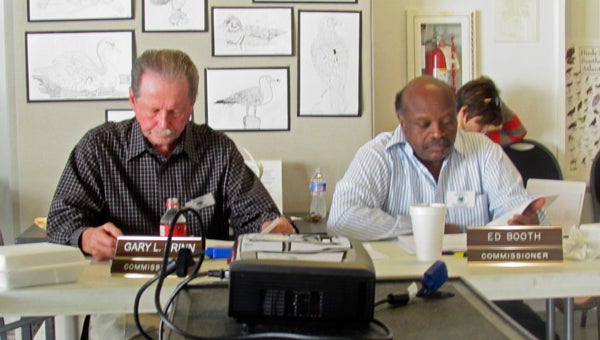County: development process changing
Published 8:30 pm Monday, February 24, 2014

MIKE VOSS | DAILY NEWS
THOUGHTFUL: Commissioners Gary Brinn (left) and Ed Booth are deep in thought as they review documents during the Beaufort County Board of Commissioners’ retreat last week.
Changes in state government, particularly with the N.C. Department of Commerce, will present challenges and opportunities when it comes to economic development in Beaufort County, according to Bob Heuts, the county’s chief economic developer.
Speaking to the Beaufort County Board of Commissioners during its two-day retreat last week, Heuts explained how the state is taking a different approach to economic development. The new approach includes the loss of tax credits previously available. Those tax credits that will be lost in the near future include renewable-energy projects and restoration of historic structures in historic districts, Heuts said.
State funding for North Carolina’s Northeast, a regional group that includes Beaufort County and helps foster economic development, will dry up, Heuts told the commissioners. The group, along with others like it across the state, will have to find funding sources to provide the revenue needed for it to operate and carry out its mission, he said.
“The winds of change are blowing,” Heuts told the commissioners.
Some of that change could be good for the county, he noted. Heuts said Beaufort County’s involvement with North Carolina’s Northeast would be important when it comes to economic development.
“As a result of the Miami boat show (attended by a representative of North Carolina’s Northeast), we’ll probably get a visit by a boat manufacturer up here very soon. That’s the word that I’ve gotten back,” Heuts told the commissioners. “ Boat building, as a matter of fact, is — they’re much more optimistic today than they were last year and the year before. … There’s activity out there now.”
A public-policy senior capstone team from the University of North Carolina is slated to conduct a feasibility study for a regional river-based ecotourism development for Beaufort County in collaboration with neighboring Greenville and Pitt County, according to Heuts.
“Tasks tentatively identified include identifying successful models for river-oriented ecotourism in other places, particularly places that may have similar challenges of poverty and rural development; identifying assets that could be leveraged, and missing elements needed, to develop river-oriented ecotourism; and recommending a process to further develop such an initiative among the various government and nongovernment stakeholders essential to its success. If successful, this project will lay the foundation for further work developing this initiative over the summer and next year,” reads a memorandum on several proposed projects, including an entrepreneurial strategy, for the area.




